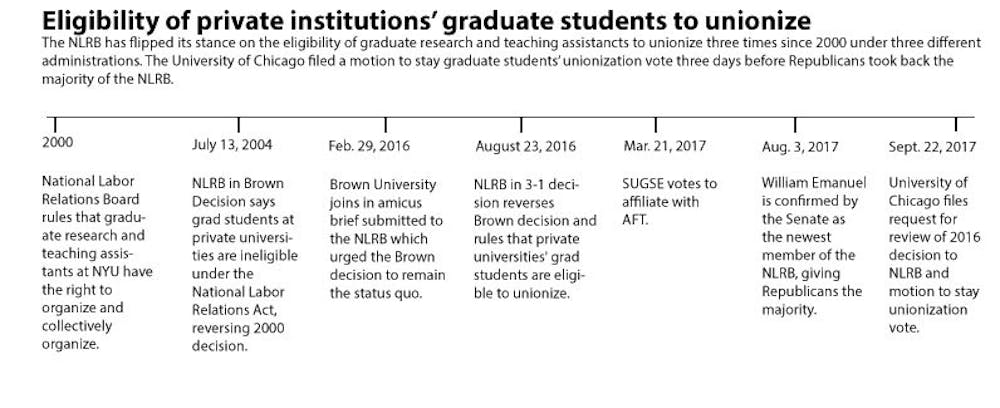The National Labor Relations Board voted in a 3-1 decision to overturn the 2004 Brown University decision that graduate students at private universities were ineligible to unionize with the verdict regarding Columbia students Aug. 23, 2016. But the window of opportunity for graduate students unionization, which has been a contentious issue at the University for more than a decade, may be closing as President Trump’s latest nominee to the NLRB William Emmanuel gives the NLRB a Republican majority. This raises the possibility of yet another reversal of this decision in the coming years.
The University of Chicago filed a motion Sept. 22 to stay the unionization election of its graduate students, which is scheduled for Oct. 17-18, the Chicago Maroon reported. This motion would postpone the unionization of graduate students due to two requests the NLRB received to review their 2016 decision. One was made by Boston College and the other by the University of Chicago.
“I would not want to speculate on decisions made at another university, as every institution is different and may be driven by factors which are not relevant to our community,” wrote Dean of the Graduate School Andrew Campbell in an email to The Herald. “With respect to the recent Senate confirmation of a member to the NLRB, the position of the University remains unchanged. We respect the recent NLRB decision and will comply with the law.”
The Herald previously reported that Campbell said the University believed the decision to unionize should be made by eligible graduate students free of intimidation within an open and informed environment.
Members of Stand Up for Graduate Student Employees will continue to operate with the expectation that the University will abide by the NLRB’s 2016 ruling, wrote Katherine Thompson GS, a member of Stand Up for Graduate Student Employees, in an email to The Herald.
“SUGSE expects that the administration will abide by the statement they made in response to the Columbia decision in August 2016, saying that they recognize as law the NLRB’s ruling that graduate students are also employees and thus have the right to bargain collectively,” Thompson wrote.
SUGSE has support in every department on campus, and will “continue to organize and advocate for a union that will allow grad students to have a meaningful voice in their working conditions,” Thompson wrote.
SUSGE is optimistic about its future activism.
“With supporters in every department and division on campus, we continue to organize and advocate for a union that will allow grad workers to have a meaningful voice in their working conditions,” Thompson wrote.
Graduate student voters selected to affiliate with the American Federation of Teachers in a vote that closed Mar. 21. In order for graduate students to unionize, their union affiliate must organize a card campaign where “30 percent of members of the bargaining unit must sign cards indicating that they want to join the union,” The Herald previously reported.
SUSGE’s website does not indicate any signs of a card campaign in the near future. The group is hoping to advocate through methods such as one-on-one meetings to “contractually guarantee essential benefits the University already provides, such as health and dental insurance, and ensuring that grad workers are involved in any decisions to alter those benefits,” Thompson wrote.





